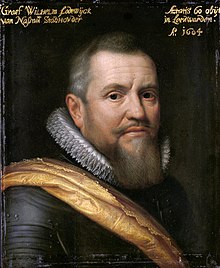William Louis, Count of Nassau-Dillenburg
| William Louis | |
|---|---|
| Count of Nassau-Dillenburg | |

William Louis of Nassau-Dillenburg
|
|
| Spouse(s) | Anna of Nassau |
| Noble family | Nassau |
| Father | John VI, Count of Nassau-Dillenburg |
| Mother | Countess Elisabeth of Leuchtenberg |
| Born |
13 March 1560 Dillenburg |
| Died | 13 July 1620 (aged 60) Stadhouderlijk Hof in Leeuwarden |
| Buried | Jacobijner church in Leeuwarden |
William Louis of Nassau-Dillenburg (Dutch: Willem Lodewijk; West Frisian: Willem Loadewyk; 13 March 1560, Dillenburg, Hesse – 13 July 1620, Leeuwarden, Netherlands) was Count of Nassau-Dillenburg from 1606 to 1620, and stadtholder of Friesland, Groningen, and Drenthe.
William Louis was the eldest son of John VI, Count of Nassau-Dillenburg and his first wife, Elisabeth of Leuchtenberg.
He served as a cavalry officer under William the Silent. Together with his cousin (and brother-in-law) Maurice of Nassau, Prince of Orange, he commanded the Dutch States Army and helped plan the military strategy of the Dutch Republic against Spain from 1588 to 1609.
William Louis played a significant part in the Military Revolution of the 16th - 17th centuries. In a letter to his cousin Maurice of Nassau, Prince of Orange of December 8, 1594 he set out (from reading Aelianus Tacticus) an argument based on the use of ranks by soldiers of Imperial Rome as discussed in Aelian's Tactica. Aelian was discussing the use of the counter march in the context of the Roman sword gladius and spear pilium. William Louis in a 'crucial leap' realized that the same technique could work for men with firearms.
...
Wikipedia
